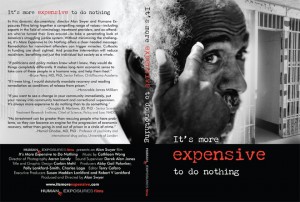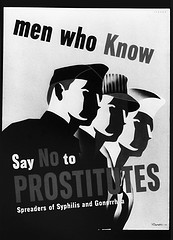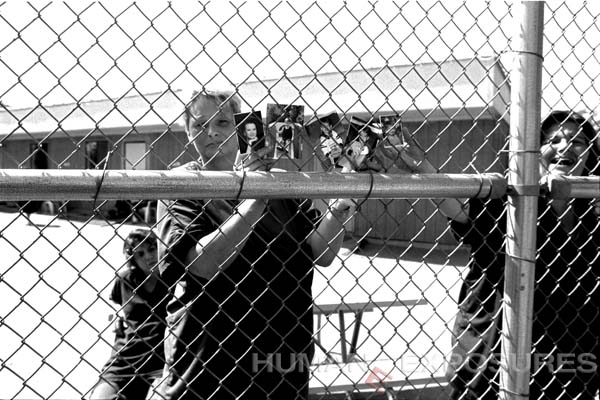 It is no secret that there is a link between education and one’s eventual path in life. Nowhere is this more painfully asserted than by the number of dropouts that end up in jail or prison. In Alabama, the officials have taken notice, and are using a short documentary film to communicate the “stay in school and out of prison” message to the students. Rick Harmon, a reporter for The Montgomery Advertiser, fills us in:
It is no secret that there is a link between education and one’s eventual path in life. Nowhere is this more painfully asserted than by the number of dropouts that end up in jail or prison. In Alabama, the officials have taken notice, and are using a short documentary film to communicate the “stay in school and out of prison” message to the students. Rick Harmon, a reporter for The Montgomery Advertiser, fills us in:
You wouldn’t expect drug dealers and killers to be invited into Alabama classrooms — especially not to teach. But they had a message that everyone from Gov. Bob Riley and Alabama Superintendent of Education Joe Morton to the inmates themselves believed Alabama students needed to hear.
The message was stay in school and out of prison. It was delivered by ‘lifers’ at Wetumpka’s Tutwiler Prison for Women and Atmore’s Holman Prison during a 52-minute video called ‘Inside Out.’ The video, created by the nonprofit Mattie C. Stewart Foundation, was shown at tri-county area high schools last year.
We have the highest percentage of the population behind bars in the U.S. than any other nation on the planet. A Northeastern University study had reported in 2009 that, on an average day, roughly one in 10 male high school dropouts between the ages of 16 and 24 was incarcerated. With high school grads, that number is down to one out of 35, and it’s only one out of 500 among the college graduates. In 2002, the Harvard Civil Rights Project study found that 68 percent of prison inmates are high school dropouts.
These are disturbing numbers. Numbers that the documentary hopes to put a dent in. When delivering messages to kids, there is often a credibility gap that the people behind the film hope to overcome by having the actual inmates be the ones delivering it. Harmon writes,
‘I couldn’t get a good job with no education,’ one of the female inmates at Tutwiler says in the documentary. ‘That’s why I kept selling drugs. That’s why I ended up here.’
‘I wonder where I would be now if I had stayed in school and gotten the kind of education my parents had been encouraging me to get?’ says a male inmate at Holman serving life without parole.
Obviously, we believe in the power of personal narrative, especially in situations like this one. It is easy for a child to view the possibility of future incarceration as an abstract. When it transmutes into a real person, the impact is magnified many times. As always, putting a human face on these issues is vital. These raw, basic stories of humanity have a better chance of striking home than sanctimonious pronouncements or dry factoids. Especially when we’re talking to children.
We will be returning to this topic with our next book, Born Not Raised: Kids at Risk, which explores the troubled psyches of youngsters serving time in juvenile hall. The book showcases a variety of creative tasks taken on by the young detainees — writing projects, artwork, elicited responses to photographs. The revealing results underscore the Humane Exposures’ conviction that early education and youth development are the most effective strategies for breaking the cycle of at-risk behavior and helping our youth thrive. Look for the announcements about the publication date soon!
Source: “THE DROPOUT PROBLEM: Many leave schools for life in lockup,” The Montgomery Advertiser, 10/24/10
Image by dave_mcmt, used under its Creative Commons license.
Visit Us on Facebook: Humane Exposures Publishing, downTownUSA, Maggots in My Sweet Potatoes, It’s More Expensive To Do Nothing.

 A report card that examines the treatment of mothers and pregnant women in prison has been issued recently, and several states are none too happy about the grades they’ve received. (California scored a cumulative “C-” in case you are curious.)
A report card that examines the treatment of mothers and pregnant women in prison has been issued recently, and several states are none too happy about the grades they’ve received. (California scored a cumulative “C-” in case you are curious.) Picture an inmate at the end of his sentence. The barred gates of the jail open up, and he steps out into the fresh air of freedom. Let’s assume this is an inmate who has been wholeheartedly reformed, kicked his bad habits, and has a determined attitude about rebuilding his life.
Picture an inmate at the end of his sentence. The barred gates of the jail open up, and he steps out into the fresh air of freedom. Let’s assume this is an inmate who has been wholeheartedly reformed, kicked his bad habits, and has a determined attitude about rebuilding his life.

 HUMAN
HUMAN The Newburyport Documentary Film Festival, now in its third year, presents 20 films. Three judges will rate the films in a number of juried categories, and, in addition, an audience-adjudicated award will also be given.
The Newburyport Documentary Film Festival, now in its third year, presents 20 films. Three judges will rate the films in a number of juried categories, and, in addition, an audience-adjudicated award will also be given.
 Pennsylvania has had its woes when it comes to its juvenile justice system. One of the worst and highest profile problems it has suffered was the much publicized “Cash for Kids” scandal. Here is a condensed rundown via
Pennsylvania has had its woes when it comes to its juvenile justice system. One of the worst and highest profile problems it has suffered was the much publicized “Cash for Kids” scandal. Here is a condensed rundown via  One of the persistent issues in the American penal system is that it is massively overcrowded. A plethora of reasons for this abounds, as a simple Google search will show. The solutions have been in shorter supply.
One of the persistent issues in the American penal system is that it is massively overcrowded. A plethora of reasons for this abounds, as a simple Google search will show. The solutions have been in shorter supply.







